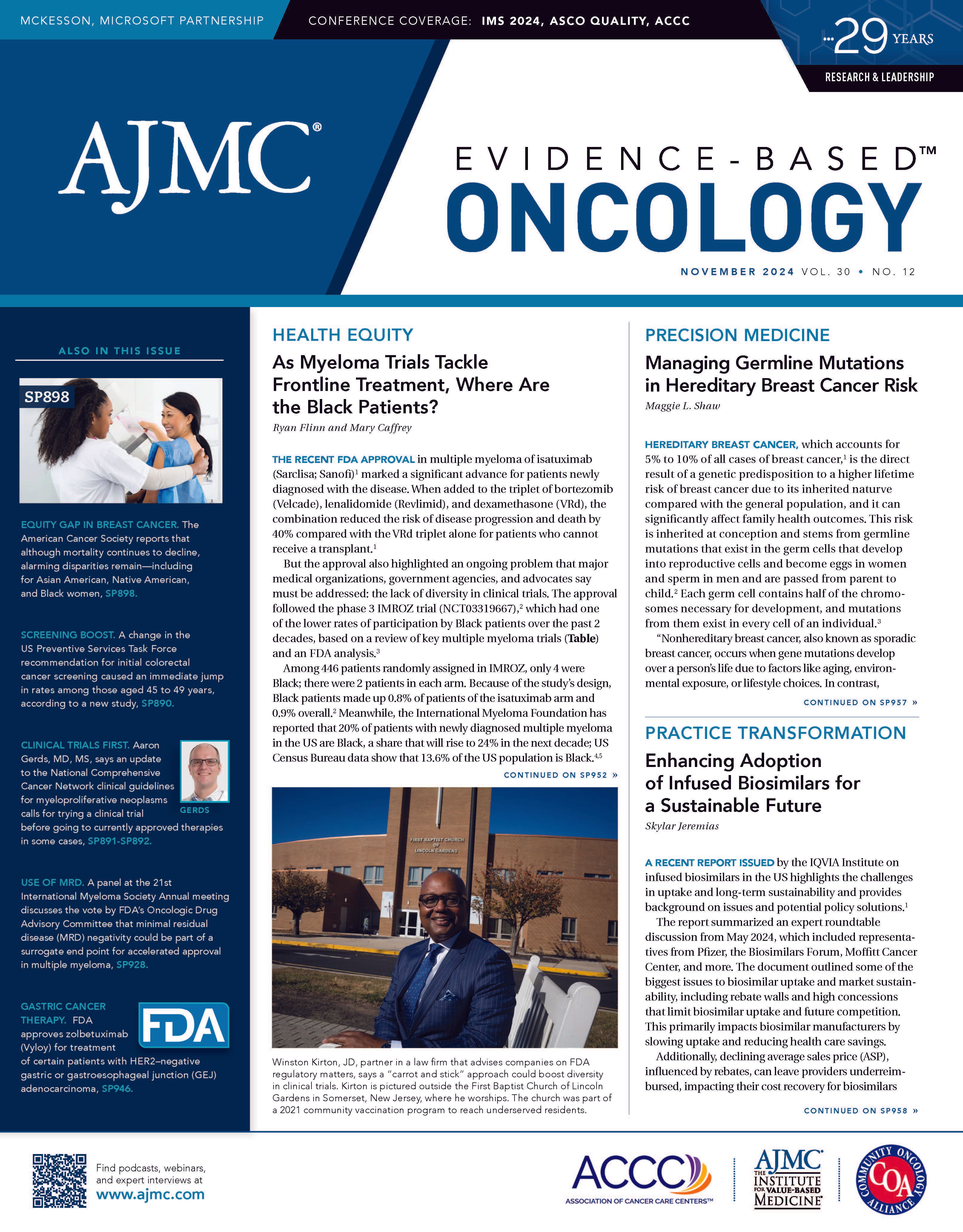- Center on Health Equity & Access
- Clinical
- Health Care Cost
- Health Care Delivery
- Insurance
- Policy
- Technology
- Value-Based Care
To Improve Clinical Trial Equity in Multiple Myeloma, Just Ask
This issue of Evidence-Based Oncology includes a special report, cowritten with our contributor Ryan Flinn, that started with questions at the 2024 American Society of Clinical Oncology (ASCO) Annual Meeting. Three years prior, as the COVID-19 pandemic lingered and the conference remained virtual, Lori Pierce, MD, FASTRO, FASCO, delivered her remarkable Presidential Address, “Equity: Every Patient. Every Day. Everywhere,” which touched on all the ways that overt racism and socioeconomic disparities create gaps in outcomes between White and Black patients.1
Some asked then whether the focus on equity would fade once the pandemic ended and the world returned to normal. However, The American Journal of Managed Care vowed to highlight these issues for the long haul through the Center on Health Equity & Access—and we are keeping that promise. So, we couldn’t ignore how few Black patients were enrolled in a pair of important multiple myeloma trials that had results presented at ASCO.2
IMROZ (NCT03319667) and PERSEUS (NCT03710603) involved quadruplet regimens for groups of newly diagnosed patients: 2 different anti-CD38 monoclonal antibodies, each given with a backbone of bortezomib, lenalidomide, and dexamethasone. Results for one study were so promising that an expert asked whether the lines between transplant eligible and transplant ineligible were still needed.2
These 2 trials could markedly shift care for many of the 35,000-plus individuals in the US who are annually diagnosed with multiple myeloma, which is well known to disproportionately affect the Black patient population. In a decade, Black patients will account for one-quarter of those newly diagnosed with myeloma in the US.
Just as IMROZ and PERSEUS were launching, the FDA warned that among all patients enrolled in myeloma trials for drug indications between 2003 and 2017, only 4.5% were Black. The trials opened, and together they randomized 1155 patients. Thirteen were Black.
The explanation that Flinn received in his reporting is that location matters. Trials based outside the US, especially those centered in Europe, were more likely to have a larger enrollment of White patients. Testing sites in the US are more diverse. When we reached Joseph Mikhael, MD, an expert and advocate in this area and the chief medical officer for the International Myeloma Foundation, he said that efforts are ongoing to address the different metrics that emerge from European-based trials. But it really comes down to FDA asking the right questions.
The FDA is taking notice. In June, it issued a draft guidance for the industry on Diversity Action Plans that would be required for certain clinical studies. The question is: What happens next?
At a May forum hosted by Citeline, Bob Zambon, a vice president for Syneos Health, said nothing will propel change more than the FDA telling a company “no” over lack of diversity. “What will drive this most of all,” Zambon said, “is the FDA saying, ‘Either do it or we’re not going to approve your drug.’”3
Change means identifying the barriers to participation and taking them on. It means going to where the patients are. It means making connections with community leaders who patients trust, such as pastors or primary care physicians. It means working with community oncologists to bring trials into remote areas. It also means not making assumptions about who can be in a trial, Pierce said.
“This is not an issue for the public, for the medical community, for the pharmaceutical community, for the regulatory agencies, for the government,” Mikhael said. “It’s really one that involves all of us.”
Most of all, as the effort by ASCO and the Association of Cancer Care Centers suggests, it calls on physicians to “just ask.”
References
1. Pierce L. 2021 presidential address: equity: every patient. every day. everywhere. ASCO Connection. June 7, 2021. Accessed November 1, 2024. https://connection.asco.org/magazine/features/2021-presidential-address-equity-every-patient-every-day-everywhere
2. Caffrey M, Shaw ML. Multiple myeloma. Am J Manag Care. 2024;30(Spec 8):SP608-SP617.
3. Karlin-Smith S. ‘Do it or we’re not going to approve your drug:’ industry reps as FDA for trial diversity sticks. Pink Sheet. May 13, 2024. Accessed October 28, 2024. https://insights.citeline.com/PS154696/Do-It-Or-Were-Not-Going-To-Approve-Your-Drug-Industry-Reps-Ask-FDA-For-Trial-Diversity-Sticks/

